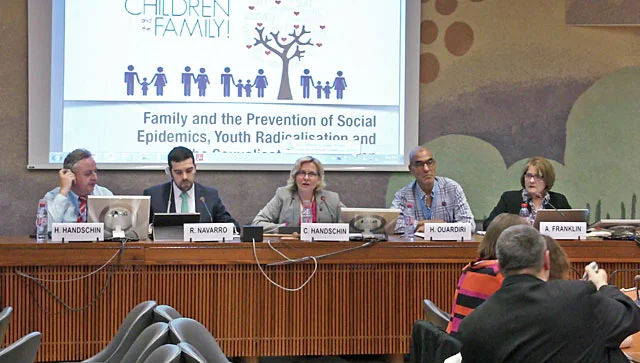Family & Prevention of Social Epidemics
Family & Prevention of Social Epidemics, Youth Radicalisation and Sexualisation of Children
CAROLYN HANDSCHIN
JUNE 23, 2016 - UNHQ GENEVA
WFWPI Side Event @ 32nd Session of the UN Human Rights Council
As government discussions took place regarding the wording of the third in a series of Human Rights Council Resolutions on the "Protection of the Family" (A/HRC/32/L.35), an important side event was being held in a room nearby on the topic "Family and the Prevention of Social Epidemics, Youth Radicalisation, and the Sexualisation of Children."
Organized by Women's Federation for World Peace International (WFWPI), Family Watch, Universal Peace Federation (UPF), Alliance Defending Freedom International (ADF) and supported by five other NGOs, the event was convened by Carolyn Handschin, Director of WFWPI UN Office, who expressed that "healthy families are an investment in community and nation, promoting empathy and social responsibility. This meeting is not about blaming parents or government, but about discovering new, preventative solutions through a re-assessment of priorities and current trends in family policies."
Annie Franklin, Director of International Activities for Family Watch International (FWI) invited the audience to watch a documentary entitled "War on Children: The Comprehensive Sexuality Education (CSE) Agenda." This controversial program is being recommended for very young children and is being introduced in public schools throughout the world (http://www.truli.com/video/the-war-on-children). "CSE is not a sex education program as we know it, but describes a dangerous assault on the health and innocence of children," explained a spokesperson for the American College of Pediatricians in the film. The dangers of this new trend in education were assessed by educators, physicians, lawmakers and concerned parents, who concluded that this very "non-comprehensive" program was essentially "designed to change sexual and gender norms of society, promote high-risk sexual behaviors and encourage even the youngest of children to experiment sexually."
Senior Council at the UN for ADF, Reuben Navarro, began his speech by relating a story. He explained that during the intergovernmental "drafting session" on the current Resolution being debated, one delegate spoke out, saying, "Alright. Now we have a resolution on the protection of the family (2015). But it is individuals we need to protect, not families. Is there even one mention in any UN founding document calling for the defense and protection of families?" The chair of the meeting responded with some irony, "Have you ever heard of the Universal Declaration of Human Rights, Article 16.3, ratified by your government in 1948? It reads, "The family is the natural and fundamental group unit of society and is entitled to protection by society and the State."" He continued by saying, "Similar mention is found in the Convention on the Rights of the Child, the International Covenant on Civil and Political Rights (1966), the Convention on the Rights of Migrants and the Convention on the Rights of People with Disabilities. I guess this oversight explains why we need new resolutions and reminders." Studies have shown that stable, natural families statistically and historically have provided benefits to communities.
Mr. Hafid Ouardiri, spokesperson for the Islamic Community in Geneva for 28 years and founder of "Fondation Entre-connaissance" was the next presenter. He said, "I always knew and was taught that to have a healthy world, we need healthy families. Life experience can make us an expert, and that is the more valuable "expertise." In Islam, the family has an extremely important position in the community and in the education of future citizens. I can only humbly thank my mother for having guided me through critical moments in my life. She had little formal education. What used to be "normal" is no longer - father, mother, children, and love were priorities. We have so little time with our children. Their time and interest is usurped by their peers and by social media. That quality of family life which is so important for our internal development and for the functioning of our moral compass has been dangerously weakened, and those who understand the importance of this quality must defend it. As a Moslem, I am constantly exposed to a stethoscope - I am expected to be and think a certain way. I find myself dealing with radicalization, sexualization and decadence every day. My heart, education and experience have always told me that the solutions are related to the family, spirituality and moral principles, yet it is so difficult to educate based on this sense of priorities today."
The final speaker, Mr. Heiner Handschin, Director of UPF UN Office in Geneva said, "I practice family values every day. What are social epidemics? This terminology can be ascribed to disturbingly prevalent elements in our society such as youth radicalization, drug abuse, and uncommitted relationships. Children in stable families are more fortunate in every way. Instability is widespread, however we cannot just accept as normal what is so unfortunate. We must visualize and strive for the highest of ideals. Statistics from the UK show divorce rates at 39% (2016); 47% of children are born out of marriage. A single parent household results in difficulties for both children and parent. The cost of family breakdown in the UK is higher than the defense budget - nearly 55 billion pounds per year. By comparison, the budget to prevent such breakdown is less than 7.5 million pounds.
Most scholars now agree that children raised by two biological parents in a stable marriage do better than children in other forms of households.
Mr. Handschin stressed that a key component of the sustainable health of families is marital commitment. Research has shown that shown that "deciding" to create a long-term commitment to family, versus merely "sliding" into a relationship, affects its quality, its longevity and the well-being of any children. When education norms in the family are absent, schools are expected to fill the gap. Children need to be taught to be good, before they are educated to be smart.

